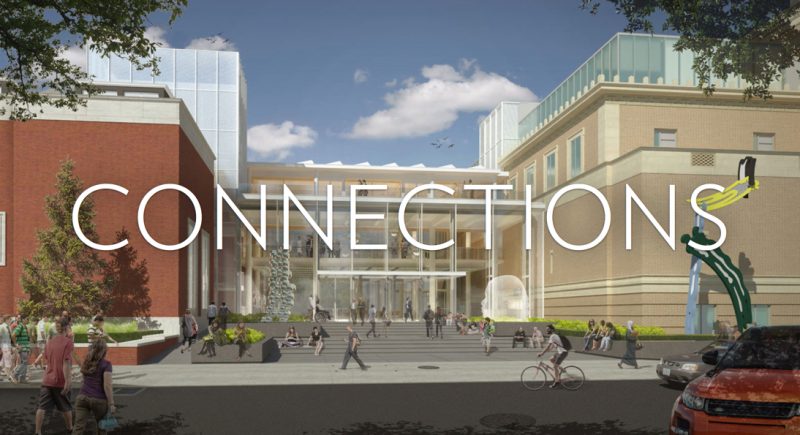
Nearly eight months after their initial request to change a public easement to make room for the new Rothko Pavillion was strongly rebuffed, the Portland Art Museum is trying again.
Who’s ready for some local industry news?
Here are the latest tidbits we’ve come across from Portland’s ever-changing bike business landscape.
In case you haven’t heard, Portland’s bike-centric holiday gift fair is back! BikeCraft 2017 is December 15-17 at the Bike Farm (1810 NE 1st Ave.) and it’s powered by Microcosm Publishing.
Last week we shared our first in a series of vendor intros written up by Microcosm Co-owner and Marketing Director Elly Blue. Here are three more…
The man driving the garbage truck that was involved in the collision that killed Tamar Monhait on August 21st has been issued two traffic citations.
The Portland Police Bureau has cited Paul Thompson for a Dangerous Left Turn and Failure to Signal a Turn. The former is a Class C traffic violation that comes with a presumptive fine of $260 and the latter is a Class D violation that has a presumptive fine of $110. If Thompson challenges the citations in court the fines could be dropped to $130 and $60 respectively.
After a fatal collision, it’s standard procedure for the PPB to defer any citation decisions until after the District Attorney completes their investigation. On October 26th the Multnomah County DA declined to pursue criminal charges against Thompson. The DA found no evidence that Thompson engaged in the behaviors required to reach the legal threshold to prove a criminal recklessness or negligence.
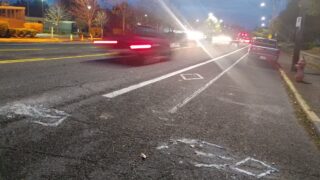
One person was killed and another person sustained life-threatening injuries in two separate crashes this weekend. Both of them happened about one mile apart in southeast Portland.
On Saturday evening around 5:40, Portland police responded to a collision near the intersection of SE 148th and Division. They discovered that a bicycle rider had been hit by a driver and was lying on the ground. “Based on preliminary information,” read their statement, “officers believe the motorist and bicyclist were both traveling south on Southeast 148th Avenue when the bicyclist was struck by the vehicle.”
The man was believed to have “serious life threatening injuries.”
Job Title *
Northwest Regional Policy Manager
Company/Organization *
Safe Routes to School National Partnership
Job Description *
Now Hiring: Pacific Northwest Regional Policy Manager
Safe Routes to School National Partnership
Applications Due: December 1, 2017 COB
Join the Safe Routes to School National Partnership (National Partnership) and use your professional talents and personal passion for advancing safe walking and bicycling to and from schools and in daily life, to improve health outcomes and create equitable, livable, sustainable communities for all.
The Pacific Northwest Regional Policy Manager (Salem/Eugene) will build on existing work in the Pacific Northwest region, concentrating on expanding the regional network in Salem-Keizer and Central Lane areas. The primary focus of this position is to increase funding and improve policies that result in the prioritization of more infrastructure and programs to support safe walking and bicycling for children and families, especially in lower-income, underserved, and historically marginalized communities. This position will work closely with the Pacific Northwest Senior Policy Manager, and is primarily responsible for interacting with the communities and local and regional governments of Salem-Keizer and Central Lane areas.
The ideal candidate’s skillset will include:
• Local knowledge of Salem-Keizer and Central Lane areas, including familiarity with leaders and decision-makers, community dynamics, and assets/challenges in those areas.
• Experience working with State agencies, understanding of Oregon’s legislative process, and knowledge of current state-level topics, including transportation, air quality, climate/energy, health, and/or education.
• The policy know-how to shape local and regional policy and funding priorities on active transportation and Safe Routes to School, including intersectional issue areas such as equity, land use, housing, education, climate, and health.
• The skill-set necessary to provide technical assistance to help communities apply for grants and implement successful Safe Routes to School and active transportation projects.
• A high level of attention to detail and project management ability paired with excellent writing and verbal communications skills.
• A deep understanding of and experience with authentic, equity-focused, community-centered engagement, and building consensus with diverse coalitions and multiple viewpoints.
Please review the job description (https://www.saferoutespartnership.org/sites/default/files/regional_policy_manager_pnw_salem.pdf) for more details about the position responsibilities and qualifications. The salary range for this at-will position is $52,000 – $57,000 depending on experience and qualifications, plus health insurance benefits, paid time off, and optional participation in a deferred compensation plan. A PC laptop, telephone, and internet access will be provided.
Location: Successful candidates will work from their home office, and must be based within the Salem-Keizer area.
How to Apply *
To Apply: Interested applicants should submit (via email) a cover letter, resume and three relevant writing samples in one PDF file to hr@saferoutespartnership.org. The PDF file shall be named as follows: [LastName]_PNW_RPM.pdf. Ensure that the subject line of your email includes the text “PNW Regional Policy Manager.”
Receipt of applications will be acknowledged with an email reply. Applications will be accepted until December 1, 2017 COB. No telephone or email inquiries, please.
We look forward to hearing from qualified candidates interested in joining our dynamic, visionary and growing national non-profit. Visit www.saferoutespartnership.org for more information about our organization.
The Safe Routes to School National Partnership is committed to equity, diversity, and inclusion in our staff, our work environment, and the change we want to see in our society. We value a diverse staff with a wide range of life experiences because we recognize that we are stronger when our organization and work benefit from the innovative contributions, creative solutions, practical know-how, and community insights brought by people of different backgrounds. Diversity of experience, ideas, and viewpoints is a priority, and candidates with varied education levels, skills, and backgrounds are encouraged to apply. People of color, people with disabilities, and people of different religions, nationalities, genders, and sexual orientations are strongly encouraged to apply.
Please forward this announcement to prospective candidates! Thank you.
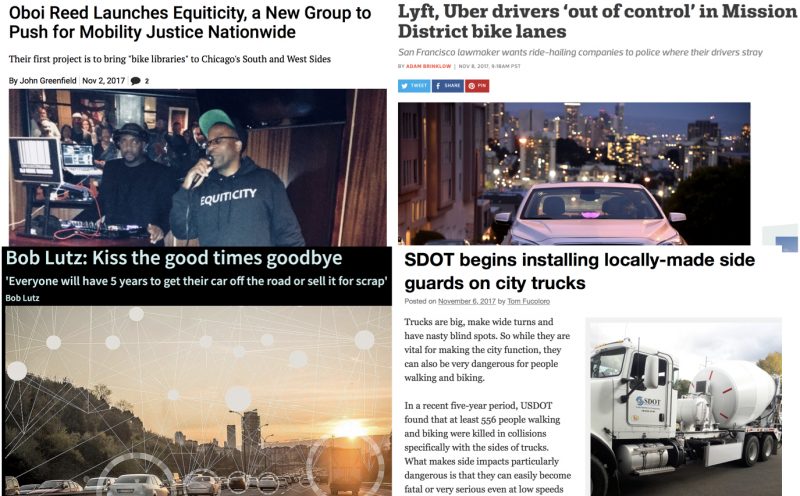
This week’s Monday Roundup is sponsored by Urban Tribe cargo bikes, which are now 15 percent off for BikePortland readers.
Here are the best stories that came across our desks last week…
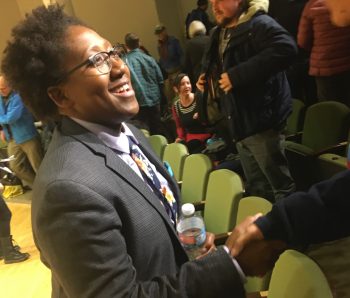
“Why don’t more African-Americans ride bicycles?”
That headline from a national advocacy organization asks a question that’s common to many planners, policymakers, and advocates. It’s a question that helped spark a discussion about equity that has been a focus of many programs, studies and initiatives over the past decade.
For the most part the response to that question has centered around standard stuff like research and data, attempts to uncover the barriers to bicycling faced by people of color, and how organizations can be more inclusive. Those are important parts of the work; but what if we’ve been avoiding the root cause?
What if we aren’t making enough progress because we’re too uncomfortable to acknowledge the racist foundation of our land-use policies, transportation system and planning culture? What if the white privilege of many planning and advocacy professionals has led to the segregation of black people out of bike lanes? What if many black people do bike, but in places white people don’t usually associate with “cyclists” or “commuters”?
Those are just some of the questions that bounced around my head as I biked home from a talk given by Tamika Butler on Wednesday night. Butler was chosen by Portland State University’s Inititiave for Bicycle & Pedestrian Innovation to give the Anne Niles Active Transportation Lecture. She didn’t hold anything back.
#pdxcyclists jump a train near SE 12th and Clinton St. The train began moving 1-2 min. later. pic.twitter.com/Vu5DqF4u5h
— Mark Graves (@markwgraves) November 10, 2017
Today Portlander Mark Graves (who happens to be a photographer and reporter for The Oregonian) just happened to be waiting at a train crossing at SE Clinton and 12th.
You won’t believe what happened next. Or maybe you will. Heck, maybe you’ve done it?
As you can see in the video he posted to Twitter, several people — tired of waiting for the train to move along – picked up their bikes and then climbed up onto and then over the train!
This seems bonkers to me. I’ve been held behind a few trains in this area over the years and I have to admit I’ve let my mind consider doing this; but I’d be too scared. Scared of the potential injury consequences and scared of getting caught and/or shamed if someone saw me do it (can you imagine the field day on local media and Twitter if “the BikePortland guy” got caught doing this?!).
Advertisement
When I first saw Mark’s tweet, I figured a lot of people would use the video to confirm their bias against “those stupid bicyclists.” The reality is, behaviors like this are mode-agnostic. People do just as crazy things in their cars. Our friend Jessica Engelman said, “I’ve seen people in cars drive up onto the sidewalk, make a U-turn, then go the wrong way up a one-way street when stopped at that intersection by a long freight train in an attempt to drive around. So yes, some people in cars attempt to do the same thing.”
Long waits for trains is a big issue in the central eastside and inner southeast. The railroad companies still use manual switches, which means a human has to come outo and adjust the tracks by hand. We’ve heard TriMet is trying to get new, automatic switches paid for in their Division Transit Project so their new, “faster” buses, don’t get caught waiting.
Have you ever done this? Any ideas on a better solution than portaging bikes cyclocross-style or doing dangerous things in our cars to get through?
— Jonathan Maus: (503) 706-8804, @jonathan_maus on Twitter and jonathan@bikeportland.org
Never miss a story. Sign-up for the daily BP Headlines email.
BikePortland needs your support.
There is no more staunch defender of the Bicycle Commuter Tax Benefit, a current federal provision that allows people to exclude (a whopping) $20 a month from taxable income for “expenses related to regular bicycle commuting.”
So when emerged that the Senate GOP’s tax plan would kill it, while retaining a $255 monthly commute benefit for parking cars, we knew Oregon Congressman Earl Blumenauer would have something to say about it. After all, he authored the current benefit and championed its passage in 2008. To Blumenauer, it’s a simple matter of equity.
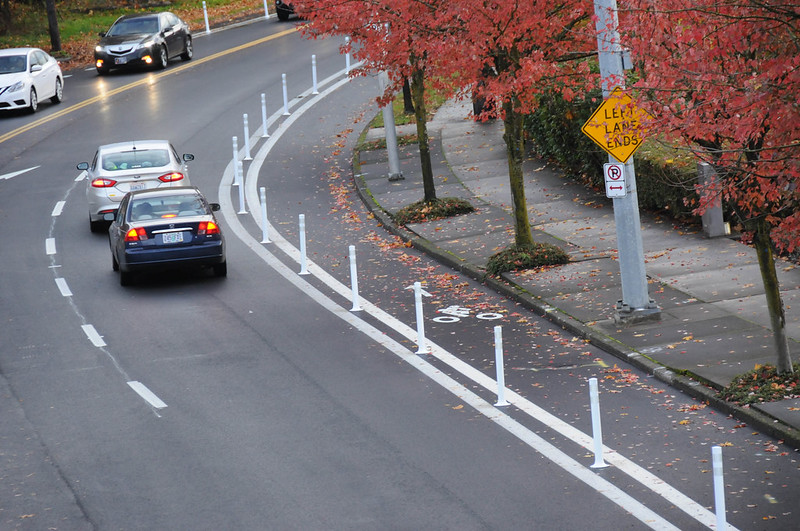
The Portland Bureau of Transportation is on a bit of a plastic wand binge.
In the past week we’ve learned of white wands (a.k.a. delineators, plastic bollards, candlesticks) going up in the Lloyd District, near the Convention Center, and on Greeley near the Adidas campus in north Portland.
Want to work on your bike or work in the bike industry? We’ve got four great job opportunities for you to consider
Learn more about each one via the links below…
–> Cycle, Deliver + Cater Food in Downtown Portland – Portland Pedal Power
–> Bike Tour Guide – Trek Travel
–> Outdoor / Lifestyle / Bike PR Agency Seeks Intern – ECHOS Communications